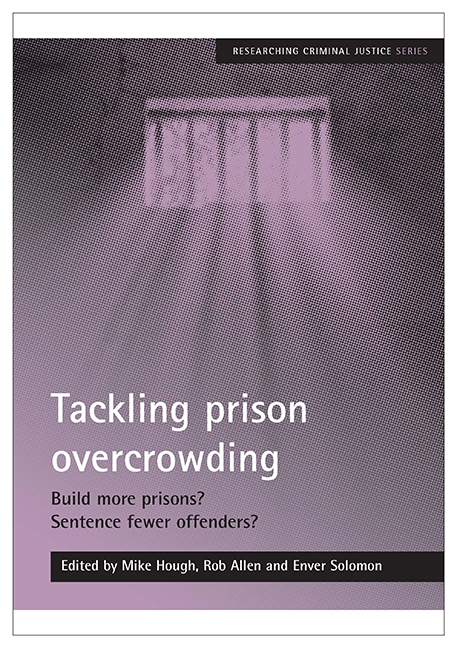Book contents
- Frontmatter
- Contents
- List of figures and tables
- Acknowledgements
- Foreword
- Notes on contributors
- 1 Introduction
- 2 The prisoners’ dilemma in England and Wales
- 3 Building on sand: why expanding the prison estate is not the way to ‘secure the future’
- 4 Towards more consistent and predictable sentencing in England and Wales
- 5 ‘Titan’ prisons: do size, efficiency and legitimacy matter?
- 6 Private punishment? An examination of the expansion, development and employment relations of private prisons
- 7 Reducing the use of custody as a sanction: a review of recent international experiences
- 8 Where now?
- 9 Endnote: latest developments in penal policy
Foreword
Published online by Cambridge University Press: 25 March 2023
- Frontmatter
- Contents
- List of figures and tables
- Acknowledgements
- Foreword
- Notes on contributors
- 1 Introduction
- 2 The prisoners’ dilemma in England and Wales
- 3 Building on sand: why expanding the prison estate is not the way to ‘secure the future’
- 4 Towards more consistent and predictable sentencing in England and Wales
- 5 ‘Titan’ prisons: do size, efficiency and legitimacy matter?
- 6 Private punishment? An examination of the expansion, development and employment relations of private prisons
- 7 Reducing the use of custody as a sanction: a review of recent international experiences
- 8 Where now?
- 9 Endnote: latest developments in penal policy
Summary
I write this foreword, not to endorse the views expressed in this publication, but to welcome an informed and critical debate of such an important issue.
In a mature democracy, what degree of risk the public will accept of further crime from known offenders and what sort of punishment is appropriate for offenders are properly for public discussion and are intensely political issues which our elected politicians have to grapple with and resolve. That debate is enhanced by good information, thoughtful analysis of it and expert opinion.
This series of papers provides a major contribution, mainly to that side of the debate which supports a reduction in the use of custody and an enhancement of interventions and punishments delivered in the community.
The end note highlights developments since the seminar, including changes to public opinion and media reaction to recent events. This challenging context partly explains the difficulty in delivering a major reduction in prison population. The public desire for increased protection from criminals and concern about violent crime and the threat of crime is part of the political reality and this cannot be ignored. Those who want to stem the apparently inexorable rise in the prison population have not only to present information and good analysis, but must find ways of making these changes acceptable to a public with a reducing tolerance level for crime and offenders.
As the Director General of the National Offender Management Service, I have to remain neutral in these difficult issues which, at an individual case level, are for the judiciary and, at a system level, for Parliament and the political process. I do, however, think that these papers will add much-needed information on and insight into these crucial issues.
- Type
- Chapter
- Information
- Tackling Prison OvercrowdingBuild More Prisons? Sentence Fewer Offenders?, pp. viPublisher: Bristol University PressPrint publication year: 2008



